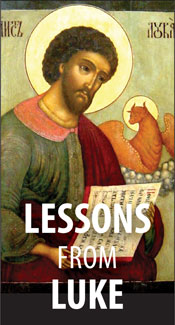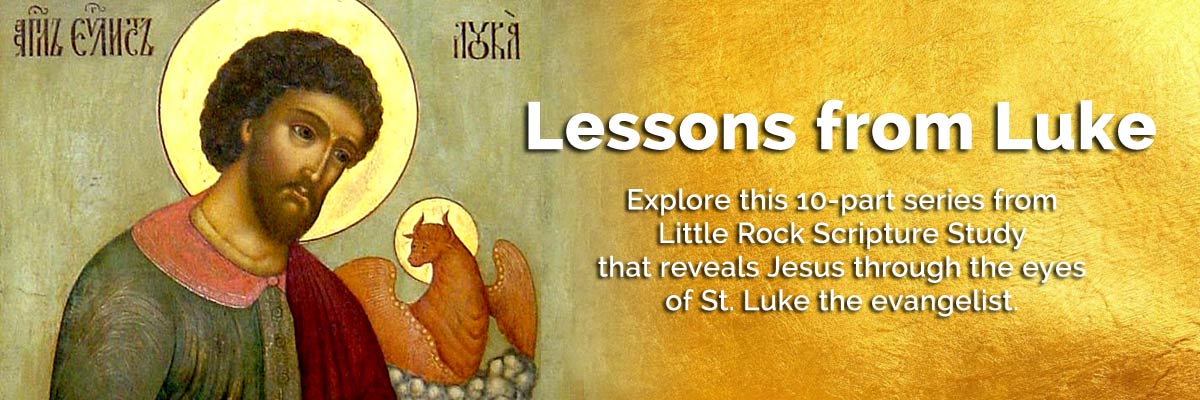Official Website of the
Catholic Diocese of Little Rock
Parables open our hearts to God’s Kingdom
Published: August 17, 2019
This is the seventh column in a 10-part series.
By Cackie Upchurch
Retired Director of Little Rock Scripture Study
Because parables are a favored teaching tool of Jesus, we return to the topic to discover some additional lessons from the Gospel of Luke. Most of the parables in this Gospel may be found in chapters 9−19, the chapters that take Jesus from the region of Galilee in northern Israel to Jerusalem in southern Israel. This journey is an opportunity for Jesus to continue shaping his disciples through his teaching in word and deed, and his interactions with those in need as well as those who are opposed to him. The parables found in this section of the Gospel of Luke drive home the lesson that the kingdom of God is unlike any kingdom that the followers of Jesus would have known.
The parables found in this section of the Gospel of Luke drive home the lesson that the kingdom of God is unlike any kingdom that the followers of Jesus would have known.
God’s kingdom reflects a world a world where Samaritans and Jews, historically bitter enemies, are neighbors who care for one another (Luke 10:29-37), where one’s treasure is not meant to be hoarded but shared (12:16-21), where the smallest things — mustard seeds and bits of yeast — will produce amazing results (13:18-21), and where sinners receive mercy (18:1-8).
Chapter 14 presents two parables that involve a banquet or a feast. One parable invites humility by warning against choosing the places of honor at the banquet table and the other recounts the tale of the invited guests who make excuses not to come and the host who instead invites the poor, crippled, blind, and lame. Some background may be of help.
Banquets and feasting have been long associated with God’s goodness and generosity for his people. For example, the prophet Isaiah, having proclaimed God’s judgment on those who violate the covenant, holds out the hope of God’s mercy and restoration when he acclaims that the “Lord of hosts will provide for all peoples a feast of rich food and choice wines, juicy rich food and pure, choice wines” (Isa 25:6). Later, in Isaiah 55, God invites all who are thirsty and poor to feast on the rich fare that God provides.
Those who pray the psalms also find multiple references to the feast God offers his people, a feast that symbolizes God’s comfort, mercy, and protection. God prepares a table for the faithful in the presence of their enemies (Ps 23:5), satisfies the soul’s desires with choice food (63:6), and quenches those who are thirsty and fills the hungry with good things (107:9).
When Jesus uses the same images — banquets and feasts — to describe aspects of God’s kingdom, he is drawing upon his own Jewish history and surely hoping his listeners will hear his teaching as a continuation of God’s gracious intervention in human history.
Chapter 15 contains three parables that modern translators and editors usually have described as having to do with lost things — a lost sheep, a lost coin, and a lost (or prodigal) son. Interestingly, ancient manuscripts of the Scriptures contain no such titles for these stories; supplying titles is a relatively modern invention to help readers navigate through the Gospels and focus on basic story plots. In each case, the listener is being asked to consider how the kingdom of God expands our understanding of who is in and who is out.
The very first verse of chapter 15 tells us that the Pharisees and scribes are challenging Jesus’ policy of inviting all to the table. “He welcomes sinners and eats with them” they complain. Never mind that they do not recognize their own sin and that they are also welcome at the table. Jesus responds not with a direct teaching such as “it is indeed God’s policy to be a generous host.” Instead, he tells them three stories that, on the surface, seem ridiculous.
What shepherd would abandon 99 sheep that are bound to go astray themselves while he goes off to find one that he lost? What woman would make such a fuss over one coin? And what father would welcome back a son who had squandered not only what he had been given, but also his family’s reputation?
We may think of God as the shepherd who risks it all, the woman who seeks diligently, and the father who generously forgives. We would do well to ask ourselves not only if this is the God we know, but if this is the kingdom where we want to apply for citizenship.
Study Questions
- If you were asked to describe the kingdom of God, what might you say in response? What images or stories would be helpful?
- What is it about a meal, especially a special celebratory meal, that speaks to you about God?
- What experiences in your life or in the lives of your friends have taught you to make room at the table for people who are different, or confused, or lost in some way? Why is this an important attitude for disciples?
- How are you evaluating your fidelity to God’s kingdom? And what spiritual practices help you to stay alert to conflicts of interest?
This article was originally published in Arkansas Catholic Aug. 17, 2019. Copyright Diocese of Little Rock. All rights reserved. This article may be copied or redistributed with acknowledgement and permission of the publisher.




